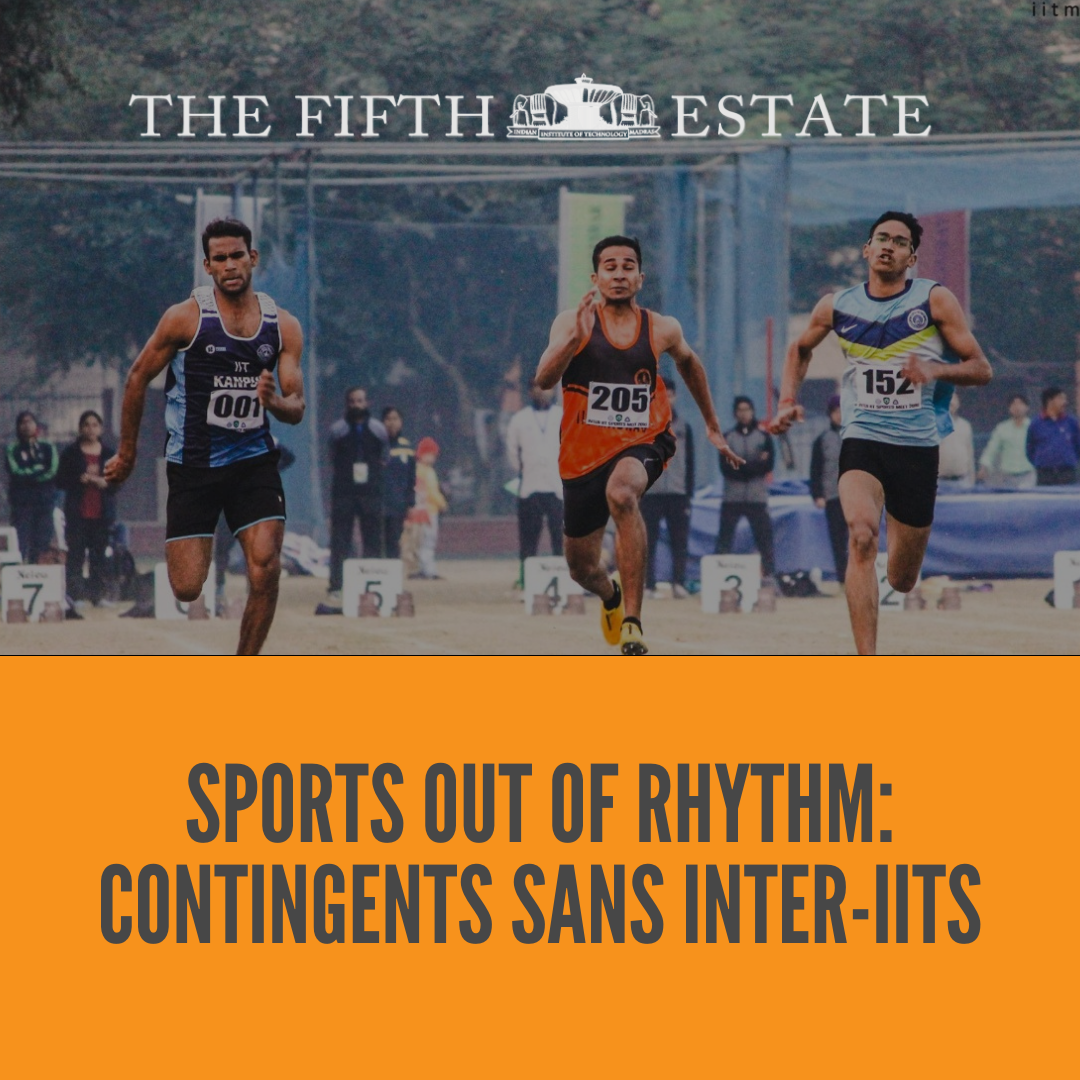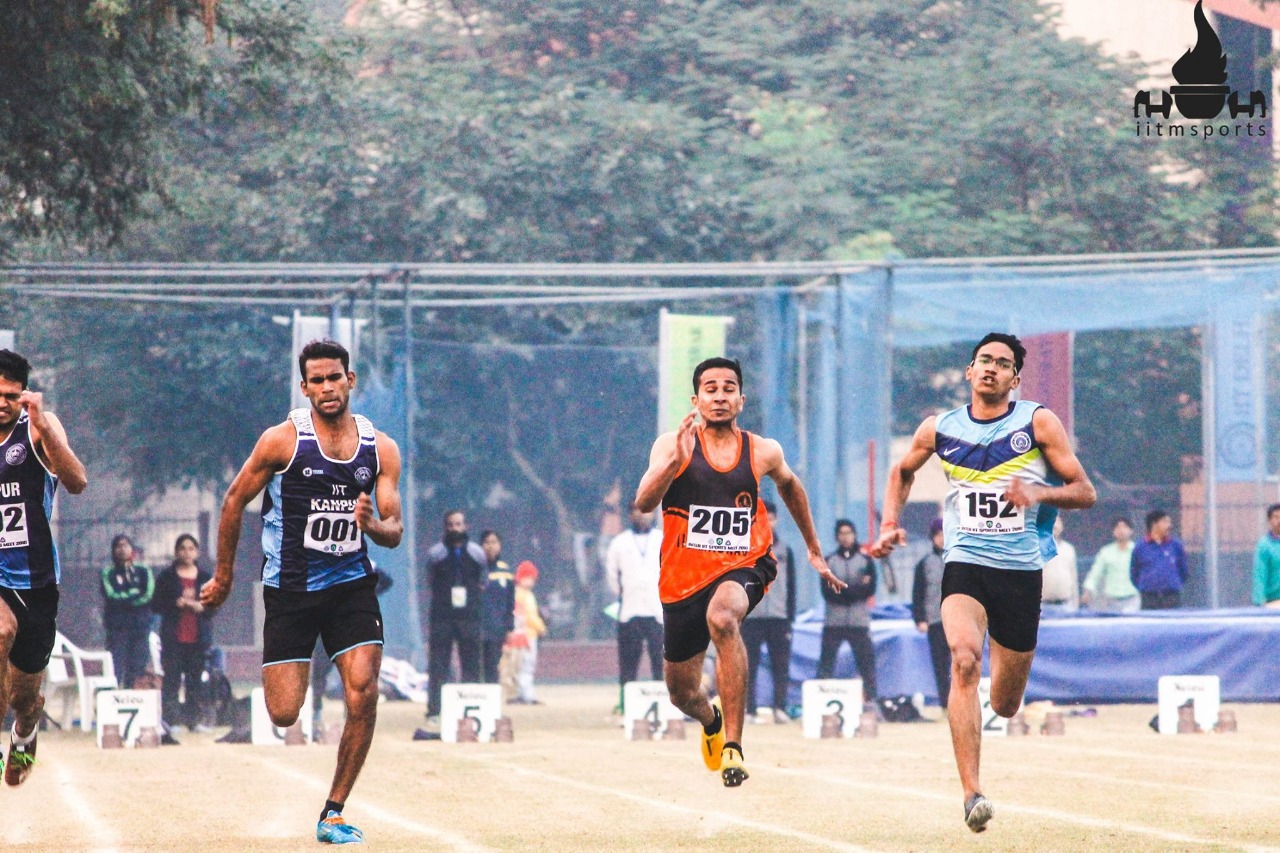Edited by Rohini Dikshit
Design by Devika Deevasan
As unforeseeable as the onset of the current pandemic was, it is now a part of the “new normal” established. The world came to an unexpected pause and an indefinite one at that. All sorts of routines had to be broken to accommodate this sudden change. With most people stuck in their homes, lethargy set in quite easily, even to the most spirited of us.
Now, as we know, along with our institute’s long-standing history of academic excellence, the sporting culture of IITM is also looked at with great admiration. Keeping in touch with the sport one is involved with is thus very important. But with this altered sedentary lifestyle, it is challenging to maintain one’s skills. So then, how are the sportspersons of Insti dealing with this challenge?
Once everyone was forced to go back home, remedial measures were initiated. Online meets were organised, and faith was kept alive that normality would be restored soon enough. Athletes strived to keep themselves fit in the hope of upcoming tourneys. But as the lockdown stretched, hopes faded. Efforts came to a standstill once the Inter-IITs were cancelled.
The cancellation came as a body blow for all the athletes prepping themselves for great things down the line. And the ones hit hardest were the graduating seniors who missed out on their last shot to don university colours.
Every year, the inter-IITs act as a rallying call for everyone involved with the sports contingent. What could be more enticing than the adrenaline rush while representing insti at the highest stage? As former aquatics captain, Ruchir Kaul stated, “The Inter-IITs are a milestone event everyone aims to excel at. Since it is out, there is a lack of motivation for the team as a whole. Despite this setback, most of my teammates have tried to maintain fitness at an individual level.” He also stated that the motivation and fitness levels would drastically improve at the first glimpse of inter-IITs.
Each sporting team involves a well-knit group of players bonded by a shared passion and gunning for glory. There are events that newbies caught a glimpse of for the first time on campus, like athletics. And then there are long-standing dynasties like the Madras Sharks, which dominated the aquatics meets year after year.
Some of the events, like water polo, were so smoothly transitioned that there were no faculties or coaches to run them. It was run by seniors who passed on their (metaphorical) scrolls of wisdom to the next generation once their time was up. Even though the same tradition seems unlikely to happen for the foreseeable future, the teams have worked towards unavoidable changes. Leadership positions were handed down, and the newly appointed captains had big boots to fill.
Some of the events, like water polo, were so smoothly transitioned that there were no faculties or coaches to run them.
“At insti, the players had set routines decided by acclaimed coaches and intense practice matchups. All of us dearly miss that level of professional expertise.”, states athletics captain Rudra. Most of the sports involved a field full of players and/or specialised equipment. All these factors led to players missing out on the match practice they longed for. However, individual workout routines were developed, often by team captains themselves, to keep the athletes in fine fettle.
Even though there was no game time, efforts were made to keep the teams’ morale high. Groups streamed matches together, and birthdays were celebrated through GMeets. The badminton contingent even had a weekly workout session. Players took videos, and feedback was provided. However, impending placements and internships led to a drop in enthusiasm for these.
Once the batch of 2020 arrived, efforts were made to reach out to the next generation to carry the baton forward. Sports orientations were conducted, and details of everyone interested were collected. After this, sessions were held with coaches and senior players for each of the specific events.
The aquatics team had a contingent initiation program too and planned workout routines to improve posture. Similarly, the badminton team also had a preliminary selection process, where video clippings of their skills were sent in. Despite this, further trials would be held once insti reopens.
Efforts were made after these selections to develop player skills through sessions online. These efforts were essentially in vain due to clashes in schedules. The fact that the 2020 batch was sick of any virtual events did not help.
As the pandemic stretched on, each of the sportspersons found themselves at different levels of fitness. Few have been able to maintain some semblance of an exercise regimen, whereas many others have experienced a severe dip in their mental health and subsequently found it harder to maintain their physical fitness. Even if the players are prepared physically, individual skills aren’t enough to ensure success in competitions when it comes to team sports like water polo, football, and cricket.
A certain level of understanding and bonding among the teammates is necessary to function to the best of their capabilities. The team becomes a core part of a member’s social circle. And as the tennis captain of two consecutive years, Nitya Nanvani says, “It’s not just about the game, but also about playing with the right people.”
In the current circumstances, it has been hard to maintain the required rapport among all the members of large teams. In most cases, they have kept in touch with the people they are closest to. Although, smaller groups like the tennis team have maintained their affinity well over regular meets and informal team bonding activities.
Even if the players are prepared physically, individual skills aren’t enough to ensure success in competitions when it comes to team sports like water polo, football, and cricket.
At a glance, it might seem that the only factors influencing a game are the teams involved and their skills. But the truth is, proper sponsorships and promotions also play a crucial role when organising a game. Being a relatively new team, it was already hard for SOC to get good deals. And now, with the restrictions accompanying the pandemic, the sponsorship and PR team are facing an uphill task to secure necessary deals.
Currently, the primary concerns regarding the sporting culture, in general, are the lack of enthusiasm and experience. To handle this, many plans are being ideated upon, and some are already in action. The usual events in SOC involved well-organised physical activities, which have been hindered. Despite that, efforts are being made to adapt and shift the sporting junta onto the virtual platform accordingly. Some of the successful talks and interviews with professionals are the results of the same.
As the inter-IITs are unlikely to be held this year, we would be represented by a contingent of untested players by the time the next tournament rolls around. This lack of match practice would cause a drop in performance like longer lap times, lower scores, etc. Even though this is an issue faced by most IITs, it would still be a dent in the history of the iconic tournament.
Along the same lines is the issue of niche sports. While cricket and football are played and celebrated with fanfare, events like athletics and weightlifting are relatively obscure. These sports are picked up by enthusiastic newcomers who gain technical inputs from seniors. With the lack of this guidance, these events would be dominated by anyone who had early access to the sport from their school days.
As for the senior players, this was their last opportunity to represent the team close to their hearts. These veterans have acted as “the old guard” with awe-inspiring stories and sage-like wisdom. Once they leave, the wealth of expertise that newcomers would miss out on is apparent.
“The passing on of wisdom and know-how of the seniors is a significant part of a team’s success. Even the best players benefit from this. We are trying our best to ensure that this legacy does not get lost.”, said Institute Sports Secretary Shreeniwas Jagadale. However, by the time the next tournament rolls around, there would barely be anyone left in the teams with exposure at the grandest stage of them all.
”The passing on of wisdom and know-how of the seniors is a significant part of a team’s success. Even the best players benefit from this”
According to Shreeniwas, plans have been made to strengthen the infrastructure and give the juniors, especially the 2019 and 2020 batches, more exposure. Once the institute reopens, the newbies and probables will be segregated appropriately and trained as required. They will also arrange interactions with alumni and a “firm plan” for NSO to grow a sense of pride and belonging, which the juniors have dearly missed. Additionally, if circumstances allow, offline interactive events might also be organised.
Meanwhile, emotions are running high among seniors as well. They have missed out on two inter-IITs when they should have been at the peak of their prowess. The taunts, the cheers, the painful losses, the nail-biting finishes- these are all moments that they would have cherished for a long time.
Moreover, our most talented players missed out on the chance to lead their team from the front as captains. The enticing opportunity to rally your mates, mentor newcomers, and motivate the team forward when they have their backs to the wall – all this sounds dreamy, but that ship has long sailed.
We must mention that even though the captains missed the opportunity to display their leadership prowess, they still performed their duties with dignity. However, all these losses add to the sting of the seniors missing out on a typical final year everyone hopes for.
Once everyone can return to Insti, the main focus will be on the team chemistry and coordination so that the newbies get a chance to catch up on parts of what that they have missed out on. No matter how uncertain the present circumstances are, efforts are being made to ensure that new sportspersons will come forward without hesitation in the future.
And to each of you waiting on the fringes, here’s a message from the former aquatics team captain, Ruchir: “Whenever you don insti colours, remember that you represent everyone who at some point has represented IITM, your friends, grads and everyone related to our college.” But until the world gets back to normal, the unmatched love story between insti and sports is set for a stint on the bench.






